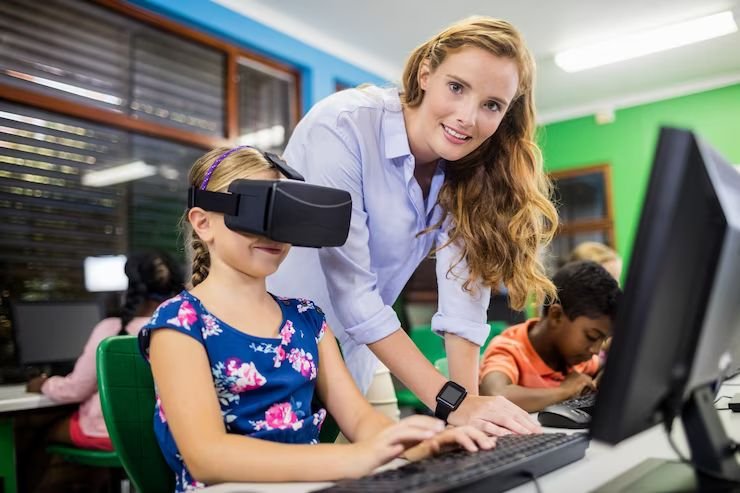Emerging technologies are revolutionizing education. From artificial intelligence and virtual reality to augmented reality, these innovations are altering how education is delivered – making it more engaging and accessible than ever. Leading this transformation are technologies such as artificial intelligence, virtual reality and augmented reality – providing personalized learning experiences while virtual reality offers immersive environments to teach a range of topics.
Augmented reality (AR) technology is being leveraged in classrooms across the world to enhance lessons by enabling students to engage with 3D models and simulations. AR helps foster an environment in which learning becomes more engaging and interactive – expect this trend to increase over time, revolutionizing education delivery processes in its wake.
1. Online Education

Online education is one of the key technologies transforming education’s future, enabling students to access educational materials from nearly anywhere around the globe and providing them with unprecedented access to learning materials and resources. Furthermore, this form of instruction offers various learning styles tailored specifically for different learners.
Online education also provides more flexibility than traditional in-person education, allowing students to take courses at their own pace from the convenience of home. Furthermore, this format increases collaboration through discussion forums and group projects; technology advances will likely make online education even more of an integral part of educational life in future years.
2. Inheriting Blockchain Mechanism To Education Technology

As technology becomes an integral part of life, education institutions have also begun embracing its benefits to make learning more efficient and effective. One such technology that has revolutionized education is blockchain. This distributed ledger stores student records safely while managing registration efficiently – all thanks to this revolutionary system!
Blockchain can also assist in monitoring student progress and providing them with essential resources, while improving access to loans and grants for education purposes. With the use of this technology, education sector is becoming more organized and efficient – thus making blockchain one of the top technologies that are shaping its future.
3. Personalised Learning

One of the technologies transforming education is personalized learning. This technology allows students to work at their own pace and focus on meeting individual learning needs while teachers use targeted instruction for every child so they can meet their learning goals more efficiently. Furthermore, through personalised learning students are provided access to educational materials tailored specifically for them based on learning styles or needs while teachers and administrators can easily track student progress and measure success.
Personalised learning can help close the educational access gap and ensure all students can gain access to quality instruction. Furthermore, this technology has the power to reduce class sizes so teachers can devote more attention to individual students – one of many technologies revolutionizing education whose effects will continue shaping its landscape in years to come.
4. Revolution In Exam Management With Education Technology

Education technology has revolutionized how exams are managed and administered. From traditional paper and pen tests to using cutting edge technologies such as Artificial Intelligence, Machine Learning, Automated Grading and Cloud Solutions – exams have never been managed or conducted like they are today thanks to education technology. The future of education lies within its embrace.
Not only can these technologies streamline and speed up the examination process, they also enable educational institutions to analyze student performance and identify areas for potential improvement. Furthermore, these technologies make the exam process safer while cutting the time taken to evaluate results – all contributing towards shaping the future of education. Thus education technology implementation plays a crucial role in shaping its future.
5. Gamification

Gamification is one of the most exciting technologies revolutionizing education. Gamification refers to using gaming principles and mechanics in non-gaming contexts like education. Gamification makes learning more engaging for students, leading to improved outcomes. By employing it effectively educators can create interactive learning experiences that engage pupils to retain information more readily.
Gamification can be applied in many educational contexts, from primary school to higher education. Gamification has already shown promising results when used to teach subjects such as mathematics and sciences as well as languages and history. As technology develops further we may soon see even more innovative and effective uses of gamification within education in years to come.
6. Virtual Reality (VR) And Augmented Reality(AR) In Education Technology

Virtual Reality (VR) and Augmented Reality (AR) are among the leading technologies revolutionizing education today. Students benefit from being fully immersed in their learning experience with these immersive technologies that foster engagement. VR provides access to virtual field trips that would otherwise be unavailable – providing hands-on approaches to education that enhance engagement.
AR allows teachers to superimpose digital information onto real world scenes, making learning more immersive and engaging for their students. Furthermore, these technologies may level the playing field for those without access to certain resources or experiences – and as education evolves further these technologies could play an invaluable role in shaping its future.
7. AI-Based Personalised Analysis Of Individual

Artificial Intelligence (AI) is revolutionizing education and revolutionizing our learning methods in unprecedented ways. One AI-powered technology that is revolutionizing how we learn is personalized analysis of individual students; with AI tools teachers are now able to collect and analyze student learning patterns, preferences and performance so as to tailor teaching methods and materials according to each student’s individual needs.
AI-based personalized analysis leads to better results for students by offering them a more customized learning experience tailored to their strengths and weaknesses. Students can receive real-time feedback on their progress as well as pinpoint areas requiring further attention – truly making education more efficient for both teachers and learners.
8.Digital And Comprehensive Online Assessments

Education is rapidly advancing due to technological innovations. One technology revolutionizing education is comprehensive online assessments – particularly digital ones which offer more accurate evaluation of students’ knowledge and progress than traditional exams can do. Furthermore, digital exams can be customized for different learning styles while being accessible anywhere with internet connection.
Technology like this also benefits teachers by giving them real-time data that allows them to make better teaching decisions and automate assessments so teachers have more time for other aspects of teaching. Overall, digital and comprehensive online assessments are revolutionizing education – becoming more efficient, effective and accessible to both students and teachers.
9. Lifelong Education

Technology has brought about significant transformation to the education sector. Thanks to various forms of technology integration, traditional methods of teaching and learning have evolved into more modernized approaches. E-learning platforms enable lifelong education; with them students can complete courses at their own pace, schedule and convenience – making lifelong learning possible! Virtual reality/augmented reality have further enhanced students’ experiences making their education interactive and enjoyable.
Artificial intelligence has also found its way into education, providing personalized learning experiences and aiding teachers with assessing students’ performances. Technology has made education more accessible regardless of geographic locations or physical barriers – creating an exciting future of education!
10. Subscription-Based Model For Learning
The future of education is being transformed by various advanced technologies. These advancements make learning easier for students. Artificial intelligence, virtual and augmented reality systems and adaptive learning systems all play an integral part in revolutionizing this sector of the education system.
With the aid of these technologies, students are now able to experience tailored learning experiences tailored specifically for their unique learning styles and abilities. Teachers can utilize them to make classroom lessons more interactive, thus increasing student participation and motivation. It’s safe to say that technological progress holds endless potential for education’s future!
Conclusion
Education is rapidly evolving, with technology playing a crucial role. One technology revolutionizing how we learn is subscription-based models; these offer learners access to courses and resources at a monthly or annual fee.
Subscription-based learning models offer many advantages to those looking to acquire new skills on their own time and in their own pace. With this technology, learners have access to high-quality resources from any location at any time; plus they can choose between various courses and topics tailored specifically to their interests and goals – giving learners total control of their own educational experience!
Subscription-based education models are also cost-effective and accessible to most learners, making education accessible for all. This technology has revolutionized our way of learning while making education more inclusive and equitable; its continued role will remain key as society becomes increasingly digitalized.
Also Read : Top 9 Technology Trends You Must Keep An Eye On





